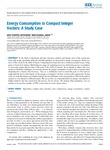Energy Consumption in Compact Integer Vectors: A Study Case

Ver/
Use este enlace para citar
http://hdl.handle.net/2183/24442Coleccións
- GI-LBD - Artigos [48]
Metadatos
Mostrar o rexistro completo do ítemTítulo
Energy Consumption in Compact Integer Vectors: A Study CaseData
2019-10-25Cita bibliográfica
J. Fuentes-Sepúlveda and S. Ladra, "Energy Consumption in Compact Integer Vectors: A Study Case," in IEEE Access, vol. 7, pp. 155625-155636, 2019. doi: 10.1109/ACCESS.2019.2949655
Resumo
[Abstract] In the field of algorithms and data structures analysis and design, most of the researchers focus only on the space/time trade-off, and little attention has been paid to energy consumption. Moreover, most of the efforts in the field of Green Computing have been devoted to hardware-related issues, being green software in its infancy. Optimizing the usage of computing resources, minimizing power consumption or increasing battery life are some of the goals of this field of research. As an attempt to address the most recent sustainability challenges, we must incorporate the energy consumption as a first-class constraint when designing new compact data structures. Thus, as a preliminary work to reach that goal, we first need to understand the factors that impact on the energy consumption and their relation with compression. In this work, we study the energy consumption required by several integer vector representations. We execute typical operations over datasets of different nature. We can see that, as commonly believed, energy consumption is highly related to the time required by the process, but not always. We analyze other parameters, such as number of instructions, number of CPU cycles, memory loads, among others.
Palabras chave
Data structures
Green computing
Optimisation
Power aware computing
Power consumption
Compact integer vectors
Data structures analysis
Compact data structures
Energy consumption
Data structures design
Green computing
Integer vector representations
CPU cycles
Memory loads
Software
Data compression
Indexes
Bioinformatics
Algorithms
Compact data structures
Data compression
Integer vectors
Green computing
Optimisation
Power aware computing
Power consumption
Compact integer vectors
Data structures analysis
Compact data structures
Energy consumption
Data structures design
Green computing
Integer vector representations
CPU cycles
Memory loads
Software
Data compression
Indexes
Bioinformatics
Algorithms
Compact data structures
Data compression
Integer vectors
Versión do editor
Dereitos
Atribución 3.0 España
ISSN
2169-3536
Ítems relacionados
Mostrando ítems relacionados por Título, autor ou materia.
-
World Expos. A history of structures
López-César, Isaac (By Architect Publications, 2017)This book is a fascinating journey along the history of architectural structures over the last 150 years, taking the World Expos as an original unifying thread. Nevertheless, it does not solely focus on the exhibition ... -
Estrutura laboral e demográfica de Moeche
Soto Quetti, Lorena (2016)[Resumo] Este traballo pretende mostrar a evolución demográfica do Concello de Moeche, comparando coa poboación galega. Estudar a estrutura demográfica da poboación e a influencia que esta ten sobre o mercado laboral. O ... -
Deployable space grids with lockable joints
Pérez-Valcárcel, Juan; Muñoz-Vidal, Manuel; López-César, Isaac; Suárez-Riestra, Félix; Freire-Tellado, Manuel J. (Sage Publications Ltd., 2021-03-17)[Abstract] The use of deployable structures in architecture began in the 1960s, based on the pioneering work of Emilio Pérez Piñero. It has had an interesting development using bundle or scissor modules, but with solutions ...






